Ten Years On: Returning to My Life in Japan
Exactly ten years ago, on August 20, 2015, I started a new chapter in my life by joining Spiber, a biotech startup in Tsuruoka, Japan.
Here’s an old blog post I wrote on that very day: The Next Chapter Begins.
It was a day I’ll never forget. I spent the night at Haneda’s airport hotel before catching my morning flight to Tsuruoka. That evening, I sat in stillness, my mind racing through all the possible ways this new chapter of my life might unfold. Restless, I struggled to fall asleep.
The next morning, I made my way to the domestic terminal and sat by the gate, waiting for boarding. Out of nowhere, a Japanese man walked toward me with a warm smile, as if he already knew me.
“You’re from Saudi Arabia, right? Going to Tsuruoka?” he asked.
“Umm… yes,” I replied, still trying to figure out who he was and how he knew me.
Sensing my confusion, he explained, “I work at Spiber! I heard you’re coming in for an interview today.”
It was my first glimpse into just how small Tsuruoka was. Ever since, almost every flight in or out of the city has had at least one familiar face on board.
We chatted during the flight, and when we landed, he offered me a ride to the office since he was heading there too. Once we arrived and I saw how others greeted him, it became clear he wasn’t just another employee.
“Sekiyama-san, what exactly do you do at Spiber?” I asked, my curiosity piqued.
“Many things. Whatever needs to be done. I’m the founder of the company!” he replied, grinning from ear to ear.
After our final round of interviews, we went out for dinner. They offered me a monthly salary of ¥220,000 and gave me the contract. At the time, I had no real idea what that meant financially—and honestly, I didn’t care. I was a fresh graduate eager to learn and grow. I signed the contract on the spot. Only when I got home did I discover that it was about BD700 at the time.
I stayed with Spiber until the end of 2018. When I left, I didn’t close my bank account or sell my car. I left a lot of stuff. Part of me wanted to revisit Japan often. Another part of me simply wasn’t ready to cut the cord.
Then came COVID, making travel impossible. By the time restrictions eased, my residence card had expired. I could have applied for a tourist visa, but I never quite got around to it. Maybe, deep down, I wasn’t ready to face the past.
My father once told me about returning to his old university town in Oregon. The friends were gone, the familiar storefronts replaced, and the streets seemed to belong to someone else’s life. He realized then that the place he loved no longer existed anywhere but in his memory. I’ve felt the same way about my childhood home in Riyadh. How it used to feel a bit hollow, like a stage after the actors have left. Revisiting the past can be like opening a door to find the room empty, the echoes of what was lingering just beyond reach.
But my wife had always wanted to revisit Japan after a short but intense experience of the culture for work. Thanks to her enthusiasm, we started planning a trip, the first with our 4-month-old baby girl.
By late June 2025, after seven years away, I was ready to return. But escalating tensions between Israel and Iran, which led to drone and missile attacks in the region, led to airspace closures. The trip was postponed. Finally, on July 4, I set foot once again in the land of the rising sun.
It was surreal. The culture felt both familiar and distant. My Japanese was rusty, and I stumbled over basic words and phrases at first, but within a few days, it all started to come back.
Even my old mannerisms started resurfacing. Surprisingly, I could feel who I used to be. I could sense the points where I’d changed, where I’d grown tougher, more pragmatic. I was still me, but not the same me who first came here with naive, heart-driven optimism.
Walking the same streets I once strolled with my ex-girlfriend, now holding my daughter in one hand and my wife’s in the other, was a strange and beautiful contrast. Sitting alone in the hot springs where I used to spend hours reflecting, I thought about the years gone by and how much had changed. I also couldn’t help me think about how weirdly normal it feels to be taking nude baths with strangers again!
Seven years can pack in a lifetime. Alongside the joy, there was some grief. My dad’s stories had prepared me for that.
One difficult truth I confronted was learning that one of my friends from that time had been stealing from me. We’d been through incredible experiences together, and I’ll always cherish those memories.
He returned the money, and we’re on okay terms now. I don’t blame him entirely. Maybe I was too trusting. Oh and, as absurd as this sounds, he also scrapped my car without telling me. Enough time has passed that I can now laugh at how ridiculous that is.
On the brighter side, reconnecting with old friends reminded me of how powerful shared purpose can be. Years of no contact melted away instantly.
It happened early in my time in Tsuruoka, towards the end of 2015. A moment so simple, yet so deeply heartwarming. I rarely fell ill, but when I did, it was usually intense. That first time, I lay in my apartment feeling hollow and weak, too tired to cook, too drained to even step outside. The silence felt heavier than usual, and I didn’t know who I could call. Then there was an unexpected knock at the door. Ito-san stood there, smiling softly, holding a warm container of natto soup. Steam curled into the cold air as he handed it to me, its aroma rich and comforting. I sat down on the floor, took the first sip, and something inside me gave way. It was one of the most delicious things I’d ever tasted. So full of care that it literally brought tears to my eyes.
Ito-san was one of the many kind-hearted people I was lucky to reconnect with. One day, during this trip, he made my wife and I an ice-brewed cafe romano. It’s flavor unforgettable, and its gesture even more so. Seemingly simple moments like that felt deeply special. It was also lovely sharing these moments with my wife. She was able to catch a glimpse of a past chapter in my life, now unfolding right in front of her.
Catching up with Sekiyama-san and his family made me feel whole again. There’s something remarkable about sharing so many core values with people who, on the surface, seem worlds apart. They’ve always been my family away from home. I’ll never forget how, just days after I moved to Japan, they welcomed me into their home. I was a fresh graduate in a completely unfamiliar place, and they helped shape me into a more confident, grounded version of myself. Someone who could navigate not only Japan, but life itself, with a little more wisdom and a lot more heart. As always, he radiated hope, his eyes glistening with the endless possibilities of the future.
In an another old blog post, I wrote about Tsuruoka’s legendary hand-drip coffee master. Stepping back into his shop after all these years brought tears to my eyes. Even now, as I write this, I feel them welling up again. It was as if no time had passed at all.
When I think about the miracle of Japan — how a small island nation with limited natural resources and a modest population managed to rise from the ashes of World War II to become the world’s second-largest economy — I think of people like him. Kadowaki-san is the quintessence of that quiet, miraculous force. He dedicated his life to coffee, first spending 18 years under the guidance of a mentor at a renowned shop in Tokyo, before returning to his hometown to forge his own path.
On roasting days, he arrives at his cafe at 5 a.m., covering every piece of furniture and tableware with care before preparing the machines. Using a simple handheld stopwatch, he times his roasts down to the second. After the beans emerge from scorching heat, he hand-sorts them one by one, discarding any that fail to meet his standards. His right thumbnail tells the story — worn and calloused from decades of flicking away imperfect beans. The patina on the walls and ceiling reflects the countless roasts he prepared during those early mornings alone.
When it comes time to brew, he warms each cup and spoon with hot water, then reaches for his old-school cloth drip. The ritual is slow and deliberate: drop by drop, he wets the grounds until they bloom and foam, giving him visual confirmation of their quality. Then, with practiced precision, he adjusts the flow in subtle circles until the cup is ready. Because the first drops are always stronger than the last, he gives the coffee a quick stir before sliding it across the counter.
When walking into Coffea, you’ll usually find him locked in quiet concentration. Yet even in that state, he notices everything — who walked in, where they sat — serving each person in proper order. Customers wait patiently until he approaches their table. That’s simply how it works at Coffea: with patience, precision, and devotion.
My relationship with him unfolded slowly. At first there was the language barrier; later, as my Japanese improved — and with the help of Japanese-speaking friends — I began to glimpse more of his world. Kadowaki-san always seemed to know the city’s heartbeat: who was dating whom, new developments, projects in motion. If he hadn’t seen or heard from someone in a while, he would ask about them.
He met my father and sister when they visited, came to know many of my friends, and eventually introduced me to one of his own. Until that moment, I had half-believed he was a character from fiction — someone who lived and breathed coffee with no room for anything else. He has friends? I laughed to myself. But in truth, it was a turning point: a glimpse into his private world. That friend, Kikuchi-san, became very dear to me, and we shared many unforgettable gatherings at his home, with his beautiful wife.
Kikuchi-san is a legend in his own right. We bonded over a shared obsession with long-distance running. He completed more than thirty marathons across the world and had gone on to organize Tsuruoka’s notoriously grueling 100km ultramarathon. Our regular runs drew us closer.
On weekends, just for fun, he’d gather a group of runners and map out 50–60km routes. He arranged the support cars, kept us on track, and set the pace. Those epic runs almost always ended the same way — soaking in the hot springs, letting tired legs melt into the water.
Thanks to him, I joined a local running club and trained with them twice a week whenever I was in Tsuruoka. It was a refreshing way to connect with people beyond my work circle.
I twice attempted Kikuchi-san’s infamous ultramarathon, which had a strict 10-hour cutoff. The first time, I made it to 60km. The second, 80km. (If I’d had a third go, I’m convinced I would have finished — it seemed I was gaining 20km each year.)
When Kadowaki-san mentioned I was back in town, Kikuchi-san came to see me. He’s still going strong. Though he no longer runs, he now enjoys long walks, while the ultramarathon has become part of his past. The final edition of his ultramarathon took place on September 4, 2022. He got to know my wife, and they shared memorable stories and pictures of races they enjoyed.
I felt the vacant void of so many who were no longer in Tsuruoka. Higashi-san, a mentor-like figure with the sharpest mind, moved to France. Ayana’s infectious smile was absent. Oliver and Sunita had long since returned to the States. Tom was no longer there to dream up wild adventures. Daniel had slipped away just days before I arrived. And Hata-san and his wife, once a constant source of warmth, were missing too. Many familiar faces were missing. Each absence was its own echo.
There’s a final aspect of retrospection I’d have loved to delve into, but I can’t right now. I’ll have to leave it to another time. Or maybe just keep that part to myself.
Returning to Japan after all these years taught me that revisiting the past isn’t only about the places — it’s about the person you were when you knew them. Streets, cafes, and familiar faces become mirrors, reflecting both who you once were and how much you’ve changed. It feels like stepping through an open portal into another time.
Yes, many things have changed, and a few chapters are better left closed. But others, like the warmth of old friendships, the taste of hand-dripped coffee, and the quiet comfort of familiar hiking trails are timeless.
I left Japan years ago thinking I’d return often. Life had other plans. But being there again, sitting beside my wife and daughter, I realized that while I can’t relive my past, I can weave it into my present.
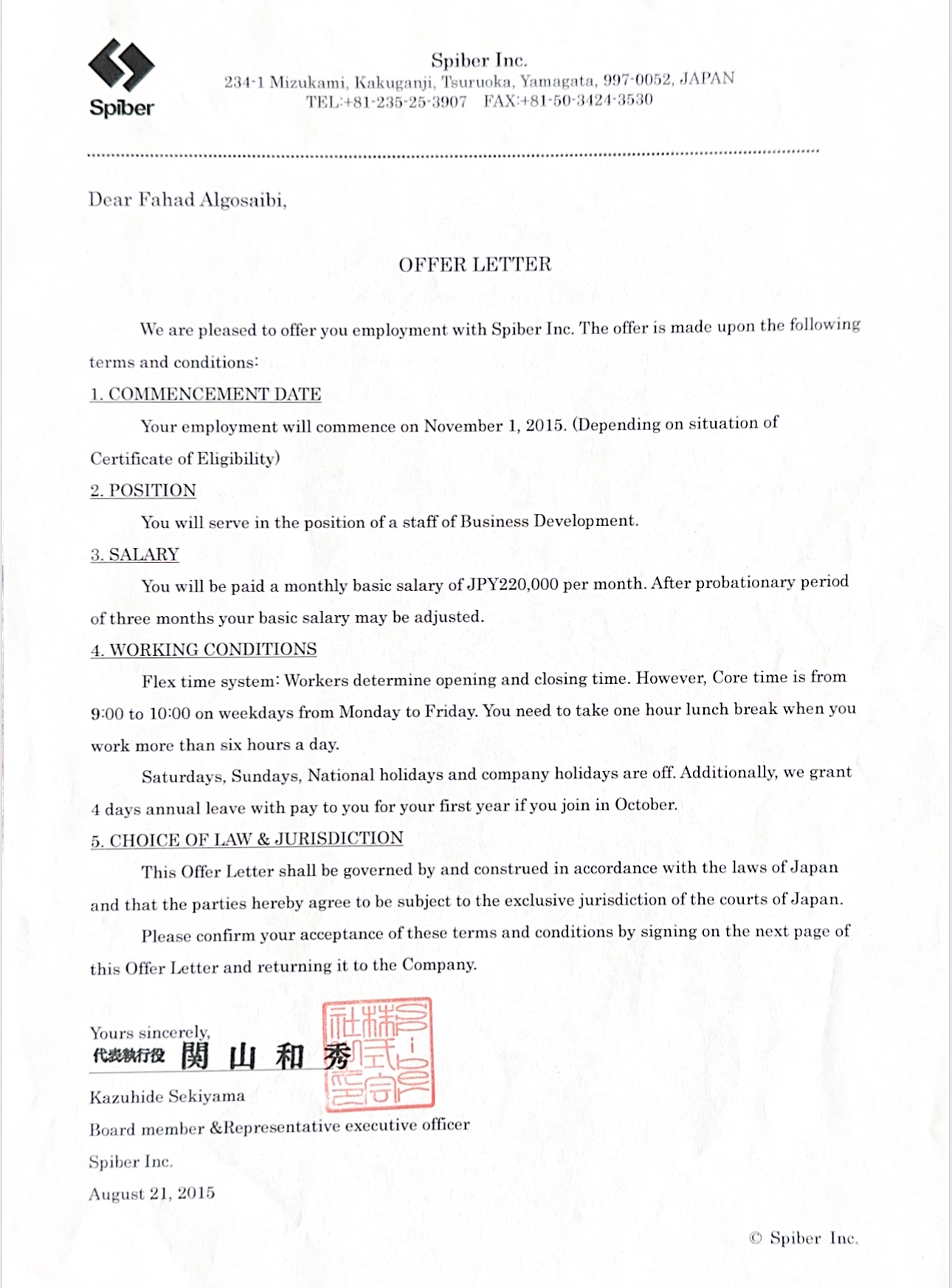
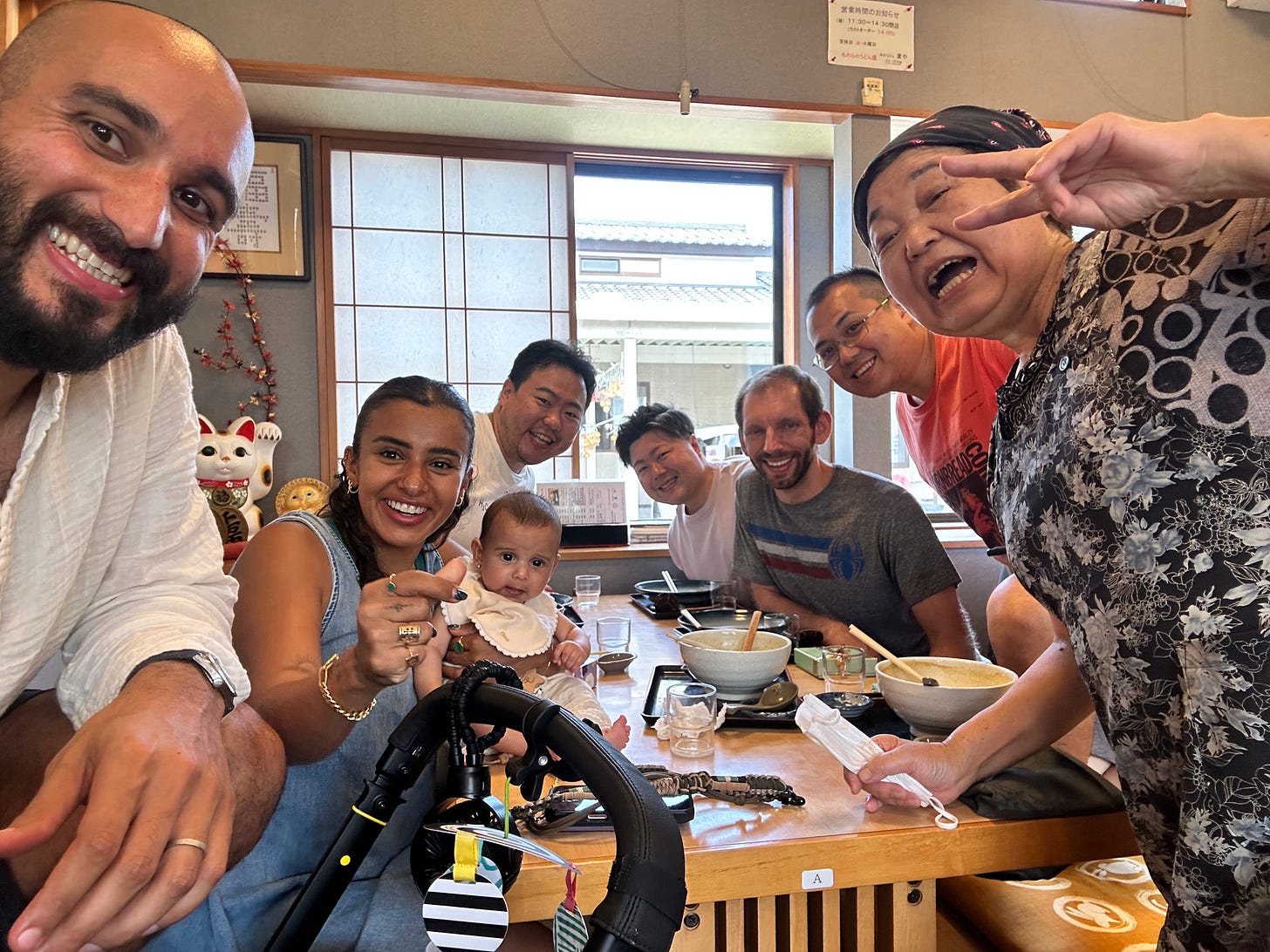
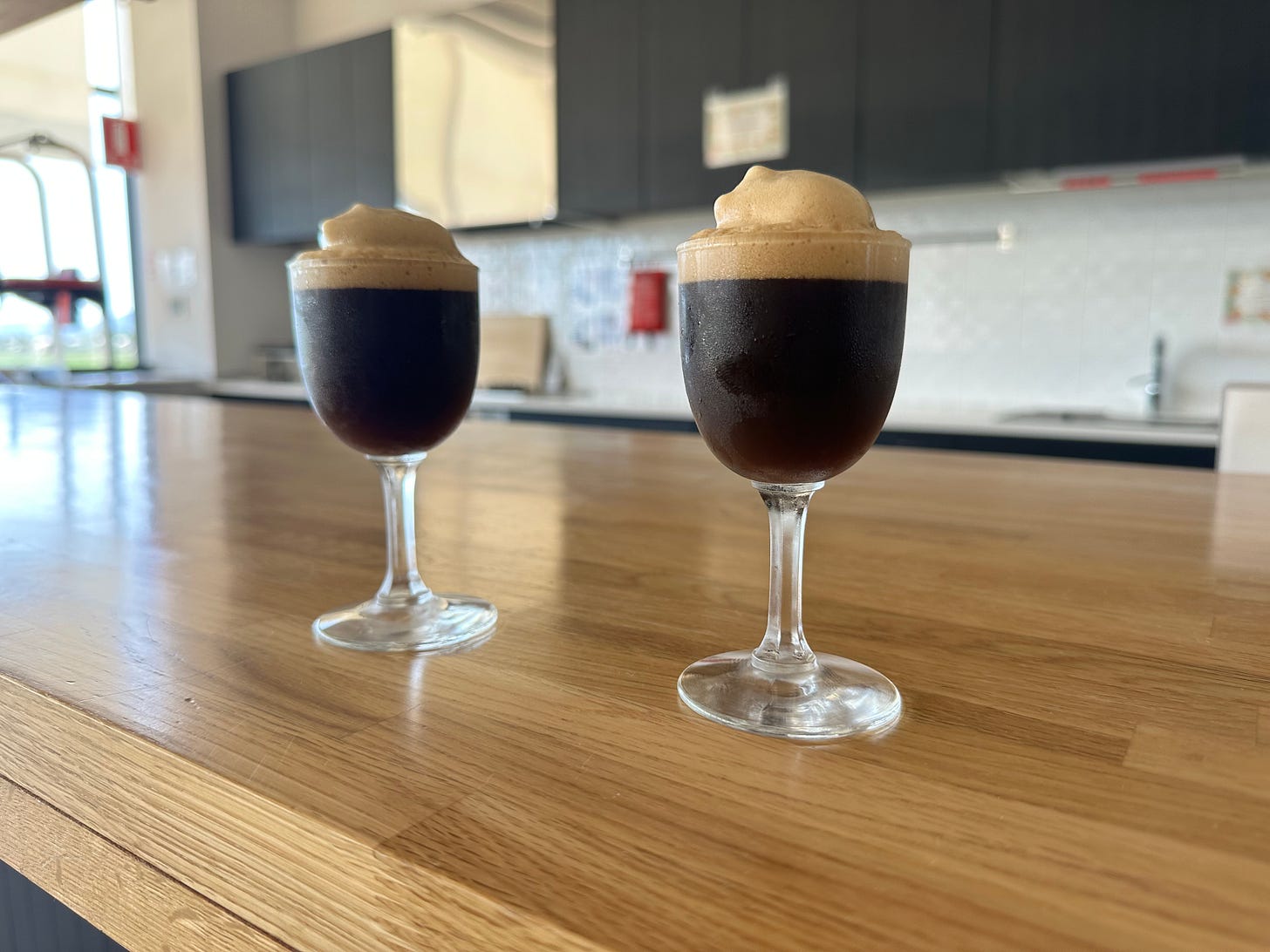
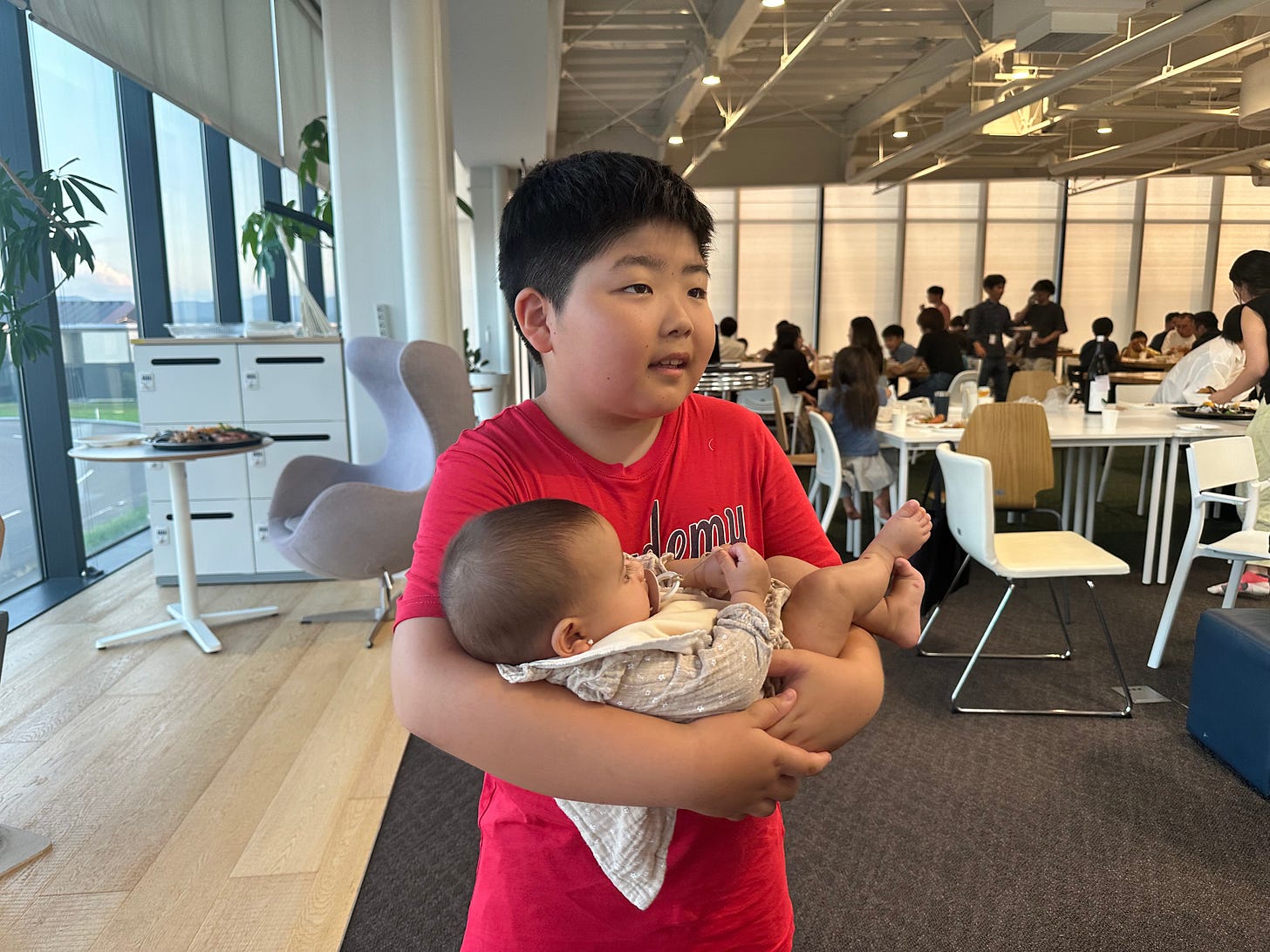
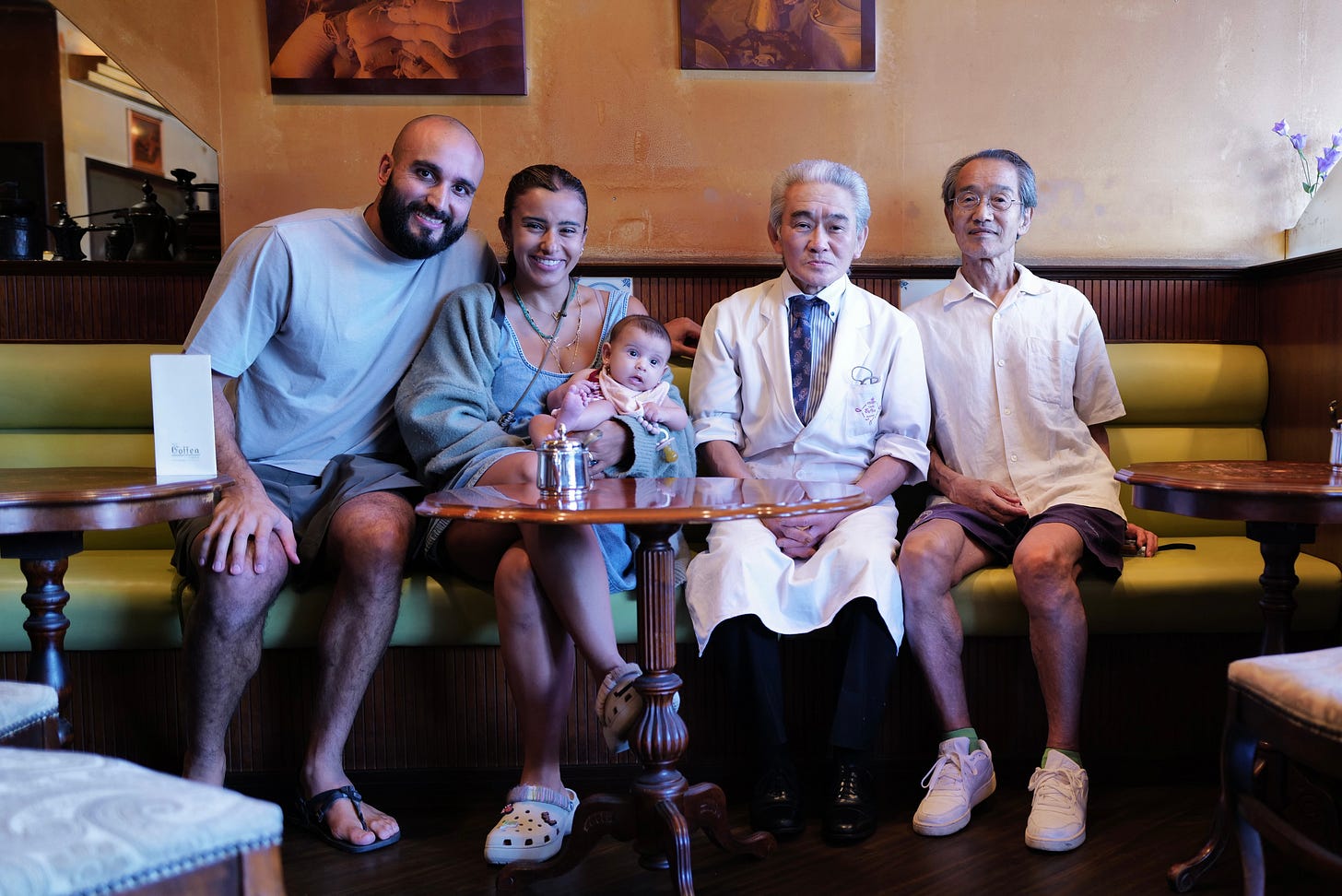
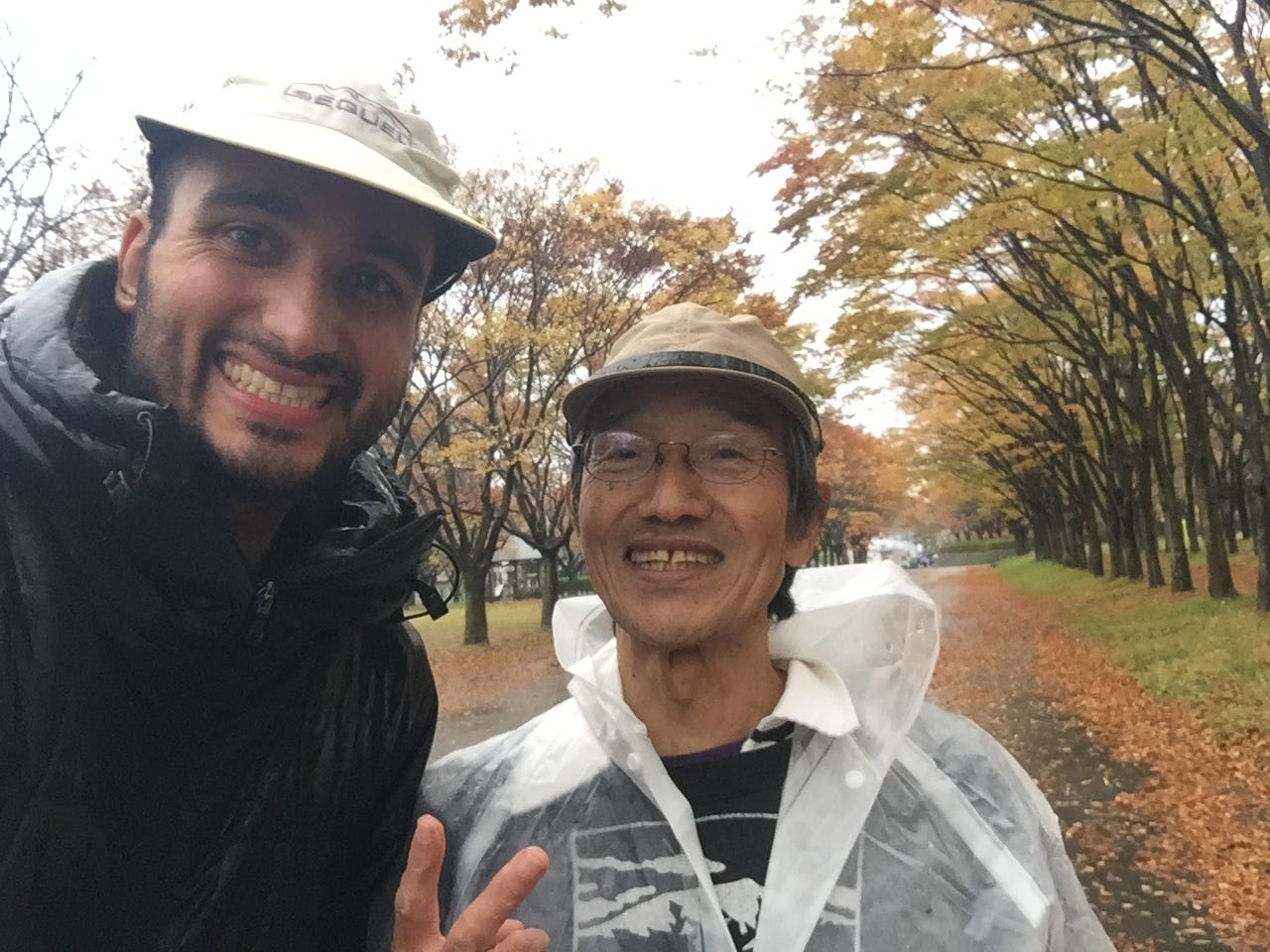
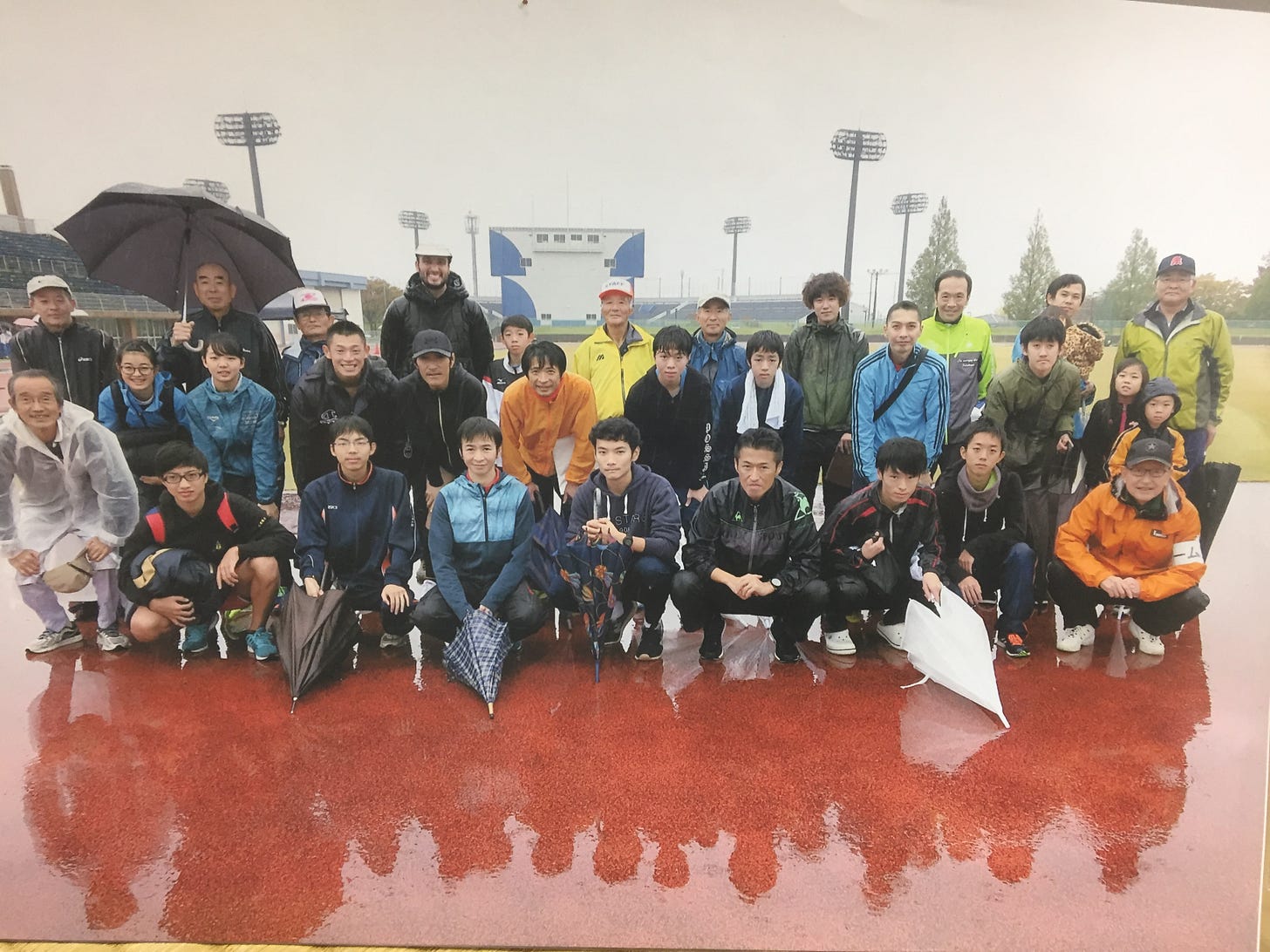
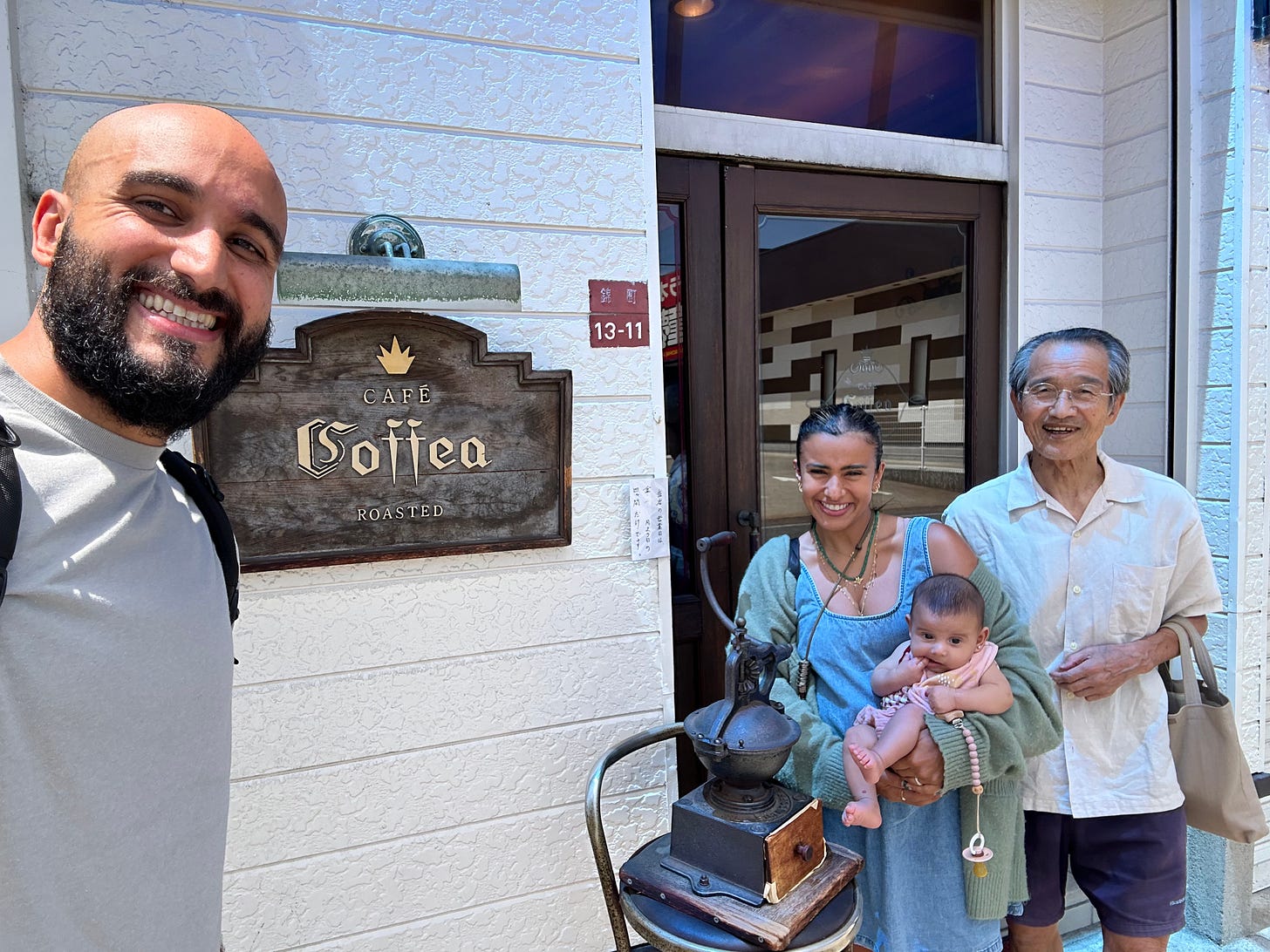
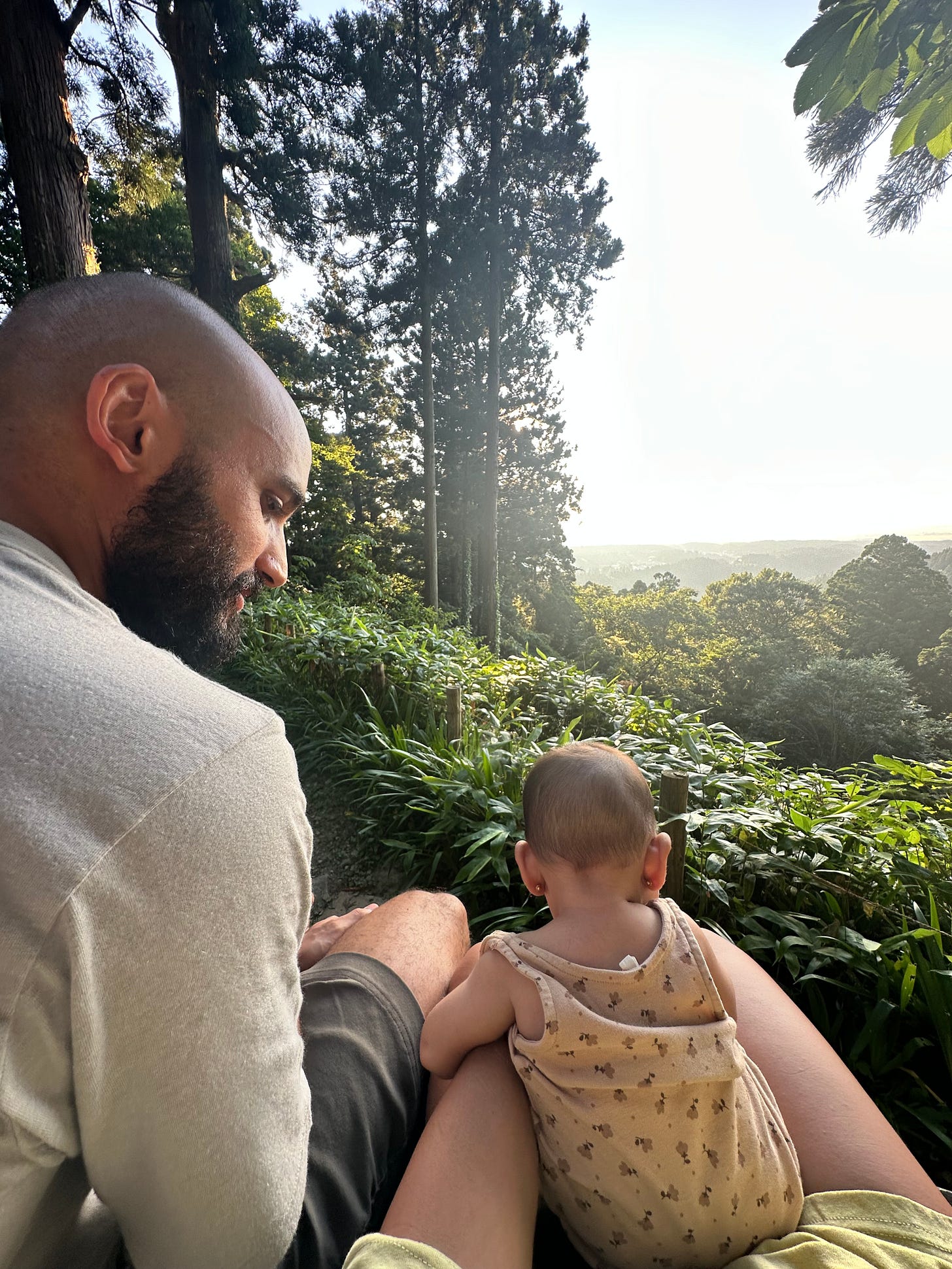
I truly felt the depth of emotions in your visit and loved the way you reflected on them. You’re fortunate to have found and managed to reconnect with memories of your younger self while tying them beautifully to your present life, with your wife and daughter beside you. I hope this special bond you share with Japan stays with you forever. Thank you for letting us be part of this wonderful - and daring - journey to your…
زيارة أماكن الذكريات القديمة 🤍
What a lovely story reliving your past with life updates. Bro, the coffee is so good and the best i ever had thank you! Now I know who's magic touches behind the amazing coffee beans.